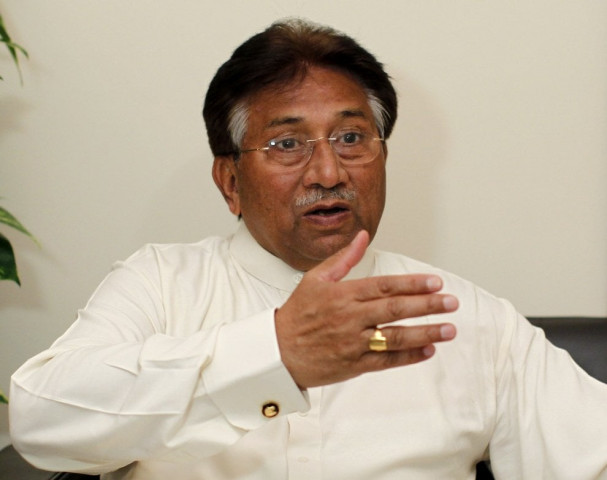Treason trial: After no-show, Musharraf wins 10-day reprieve
Special court says non-appearance on Feb 18 could result in non-bailable arrest warrant.

Replying to the concern of Musharraf’s lawyers, Justice Faisal said it was not necessary the court framed charges on the appearance of the accused. PHOTO: REUTERS
The special court trying former military ruler Pervez Musharraf for treason has given him until Feb 18 to appear before the court or a non-bailable arrest warrant could be issued against him.
On January 31, the three-judge court – headed by Justice Faisal Arab – had issued a bailable warrant for Musharraf’s arrest due to his persistent reluctance to face the treason charges and ordered him to appear on Feb 7.
However, Musharraf as well as his guarantor, Maj Gen (retd) Rashid Quraishi, did not show up even on Monday.

“It was also pointed out that even the surety, who undertook to ensure the presence of the accused in [the] court, has not appeared which by itself calls for forfeiture of the surety amount and issuance of non-bailable warrant of arrest of the accused,” the court said in its written order.
However, Justice Faisal granted Musharraf 10 more days on the personal assurance of Anwar Mansoor, one of the members of the defence team, who assured the bench that his client would appear on Feb 18.
“At this juncture Anwar Mansoor made a statement at the bar that he personally undertakes that the accused will appear before this court along with surety in the week after next as the accused has no hesitation for his appearance except that he feels that this court has no jurisdiction in the matter,” the order said.
Replying to the concern of Musharraf’s lawyers, Justice Faisal said it was not necessary the court framed charges on the appearance of the accused.

Mansoor said Musharraf was reluctant to appear before the court because the treason charges were to be read out against him while he was a former army chief and president.
“…an accused in a case has every right to call in question the jurisdiction of a court if he makes out a case but non-appearance would amount to disobedience,” the court said in its order.
Earlier, Musharraf’s defence team protested against the treason trial and said the government wanted dialogue with those who waged war against the state but was not willing to accommodate those who fought for the country.

Justice Faisal censured the lawyers and asked them to stick to the legal point rather than dragging the court into political issues. He specifically stopped Ahmad Raza Kasuri, another member of the defence team, from ‘interrupting the court proceedings’.
Subsequently, Mansoor triggered another controversy by claiming that Musharraf was on his way to the court, but his convoy was turned to the military hospital [Armed Forces Institute of Cardiology], on the orders of Interior Minister Chaudhry Nisar Ali Khan
Mansoor claimed that if the court had any doubt in this regard, it could seek the record of the interior minister’s calls.
The court did not pay much heed to the formulations of the defence counsel except the one regarding jurisdiction of the court. “We cannot decide the jurisdiction issue so far; therefore we are going to extend relief to the accused,” Justice Faisal said.
At this, one of prosecutors, Dr Tariq Hassan, said that this court had already shown sufficient indulgence to the accused though the law provided that where the accused failed to appear in terms of bailable warrant non-bailable warrant was to be issued.
Khalid Ranjha, another lawyer in the defence team, will argue the application that Musharraf’s treason case be transferred to the army court. The court will take up this application on February 10.
Musharraf’s petitions turned down
The Supreme Court Registrar Office has refused to entertain two of Musharraf’s petitions against the special court’s January 31 and January 10 orders regarding the issuance of his bailable arrest warrant as well as applicability of the Code of Criminal Procedure (CrPC).
According to sources, the Registrar Office objected that it was a personal grievance of the applicant and did not fall under the jurisdiction of Article 184 (3) of the Constitution. However, it suggested Musharraf go to proper forum against these orders.
On February 4, Musharraf moved two petitions in the SC against the special court’s two orders through his counsels regarding the enforcement of his fundamental rights enshrined in Articles 4, 10, 10-A, 12, 14 and 25 of the Constitution.
A member of Musharraf’s legal team Chaudhry Faisal Hussain advocate expressed concern over the move, saying that the Registrar Office could not decide the matter related to the jurisdiction of the case as high treason was the case of first impression “therefore, the apex court should hear these petitions”.
Published in The Express Tribune, February 8th, 2014.



















COMMENTS
Comments are moderated and generally will be posted if they are on-topic and not abusive.
For more information, please see our Comments FAQ